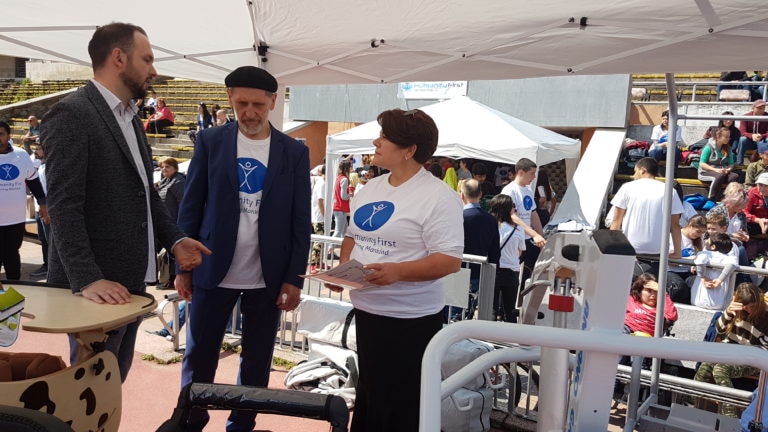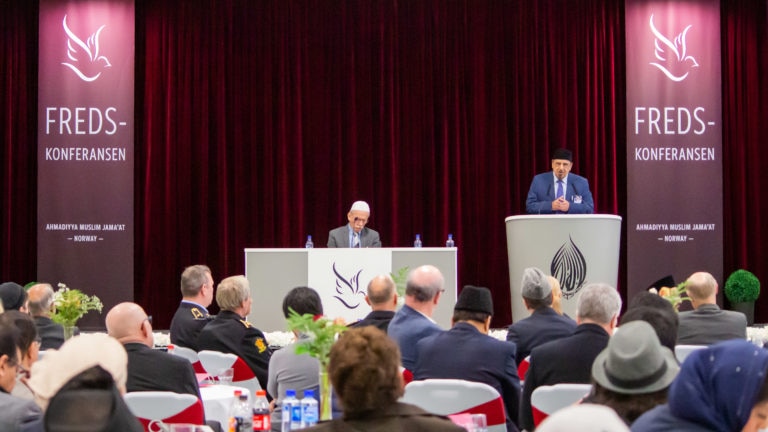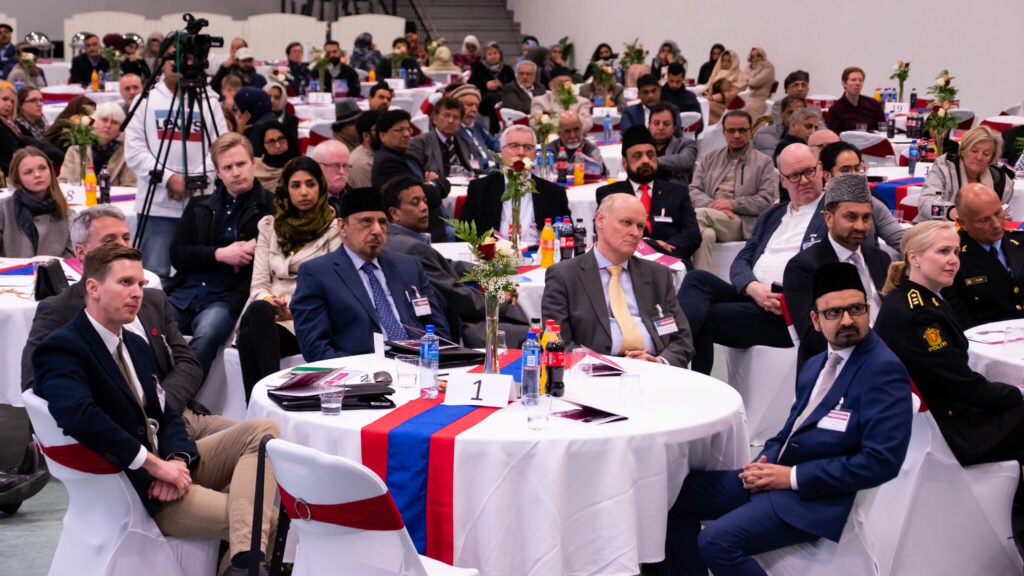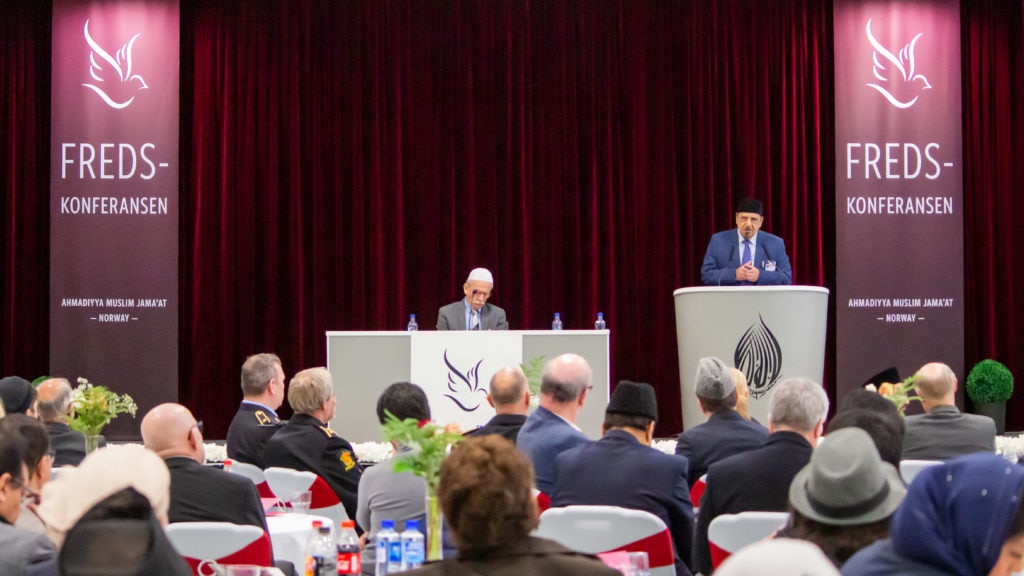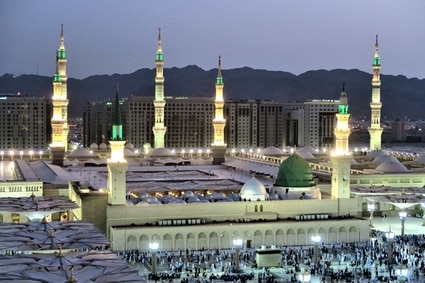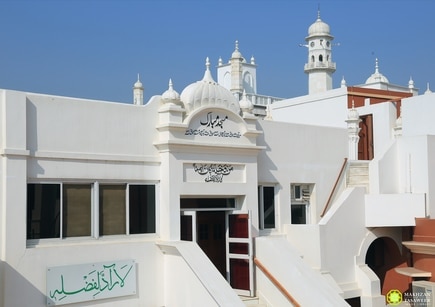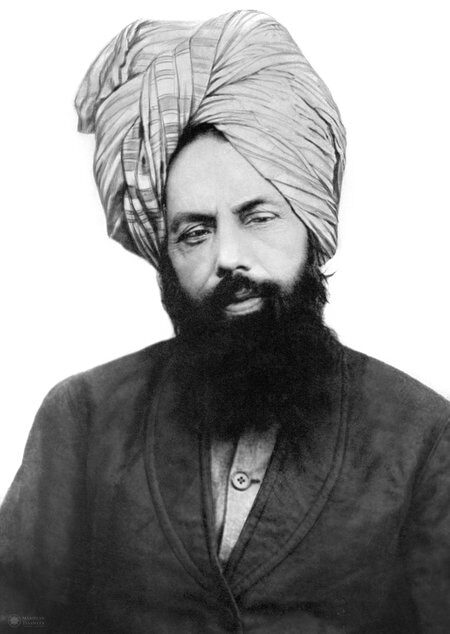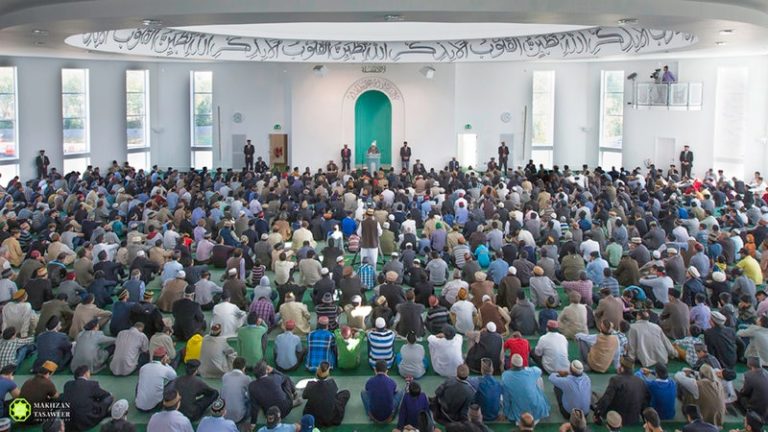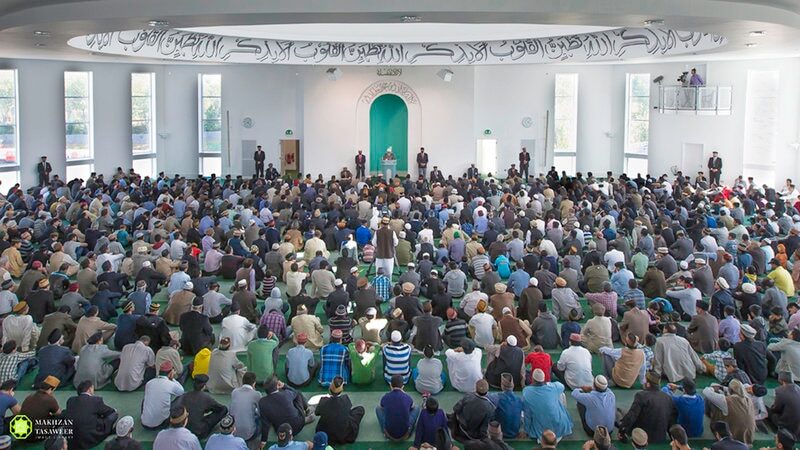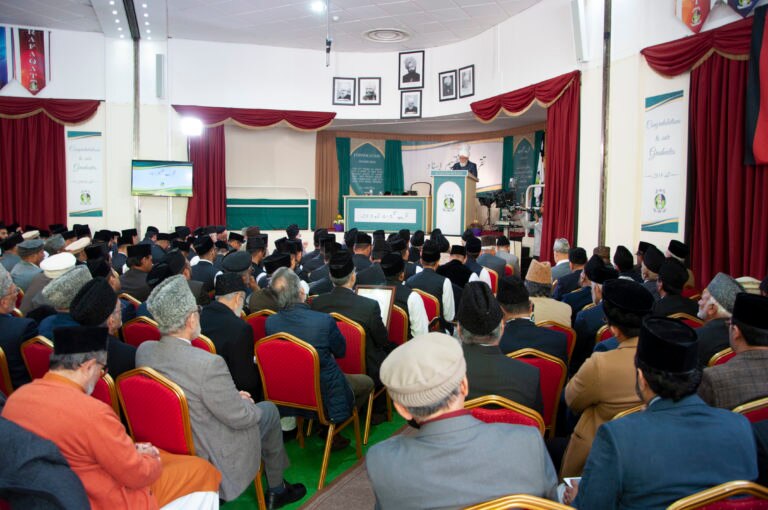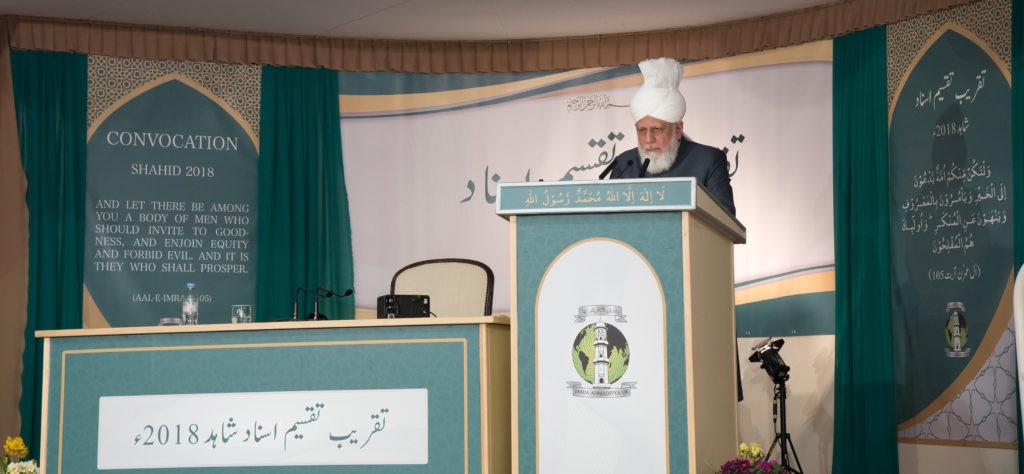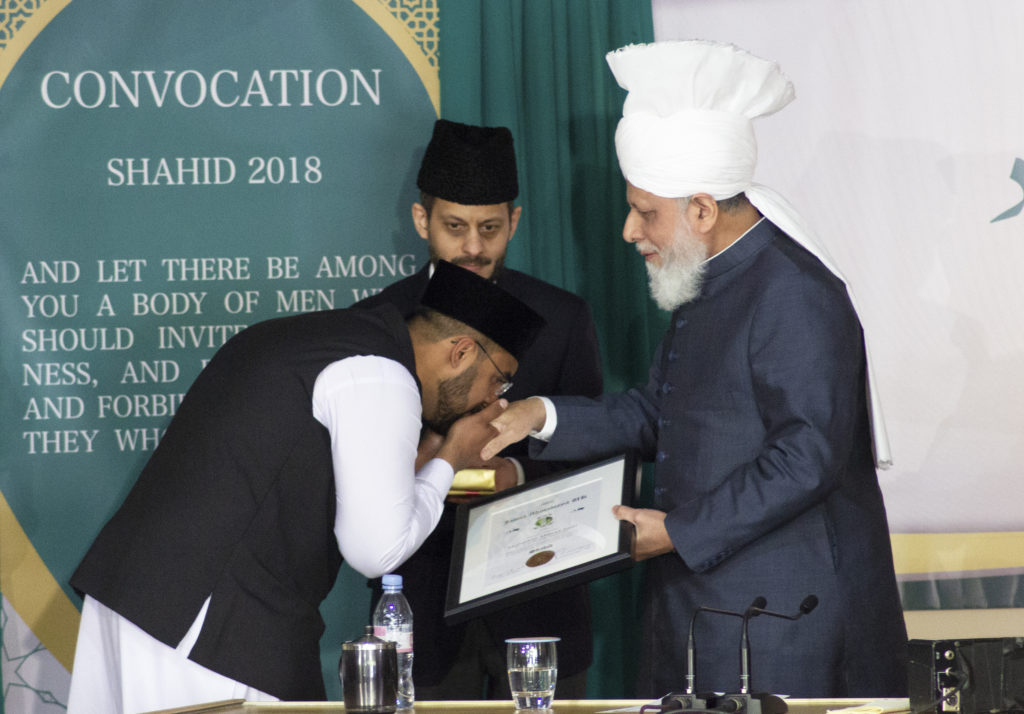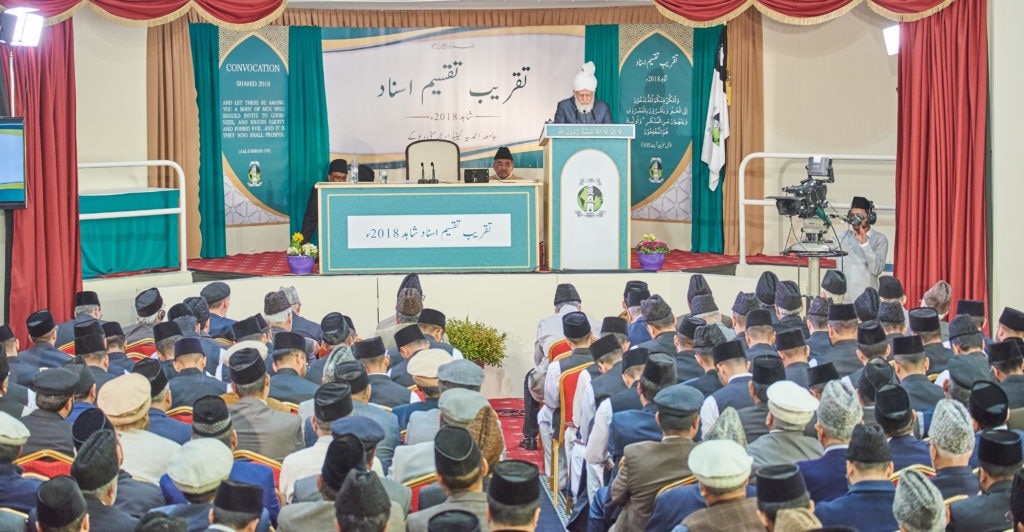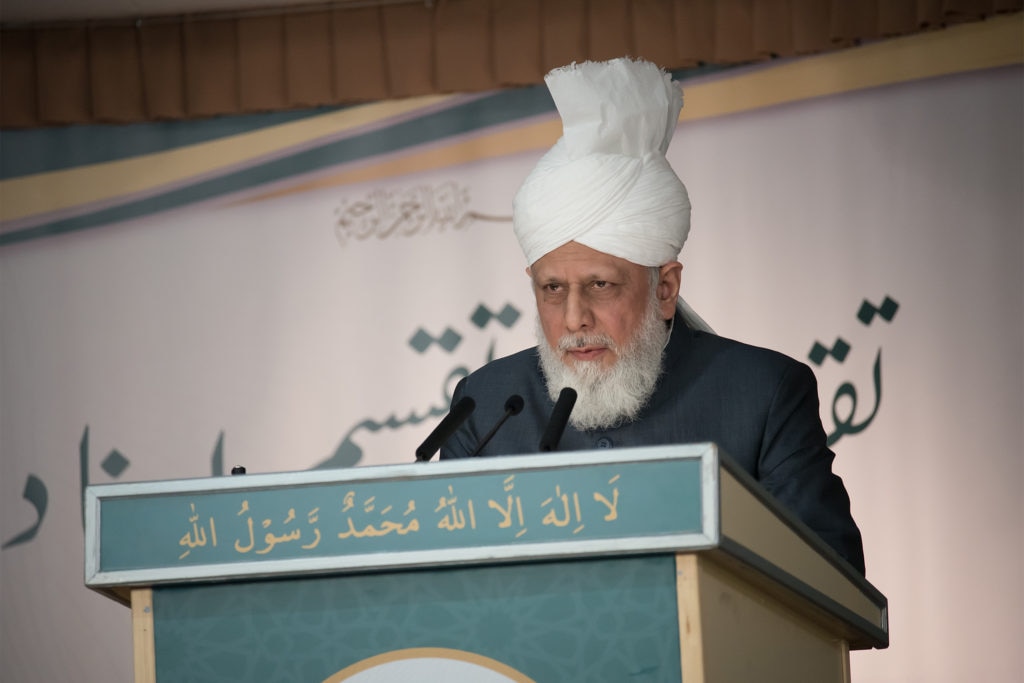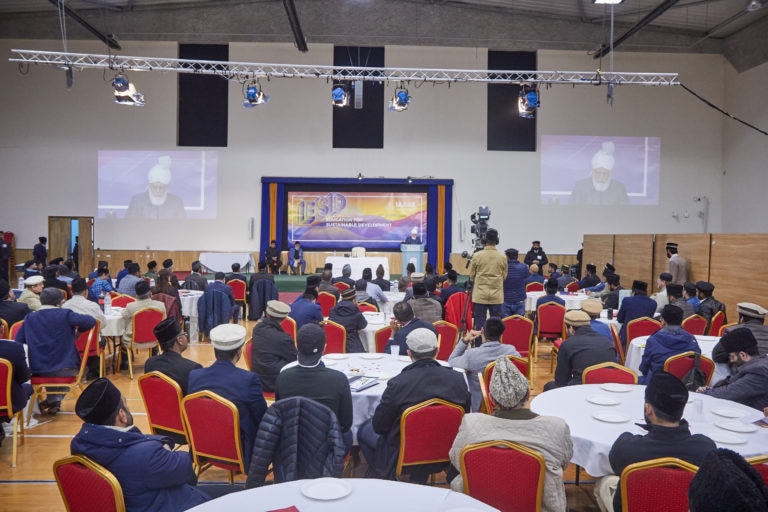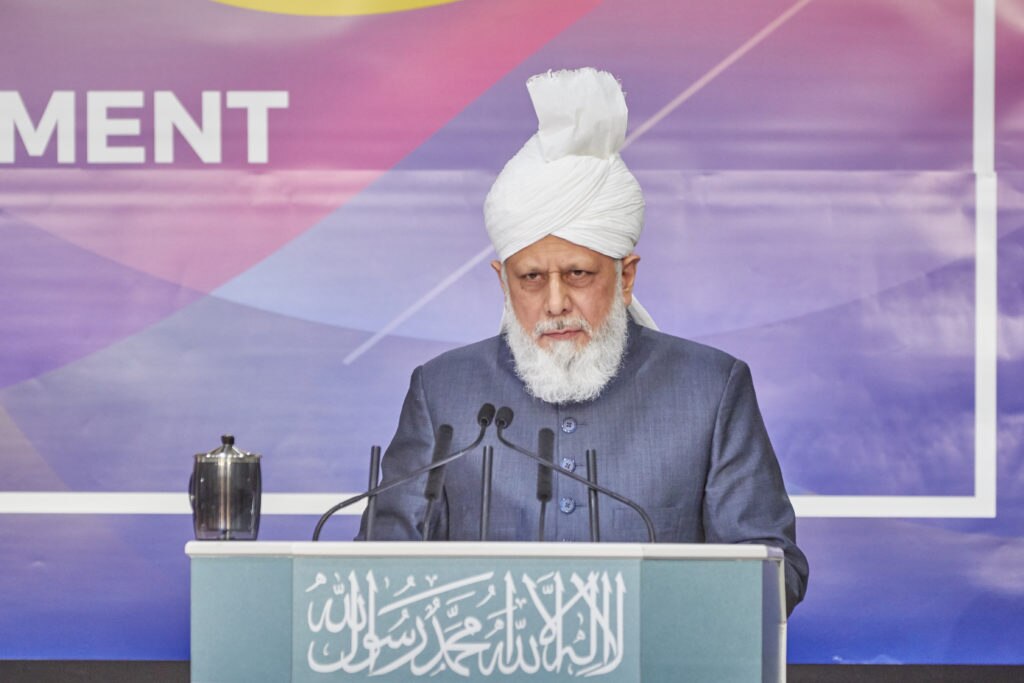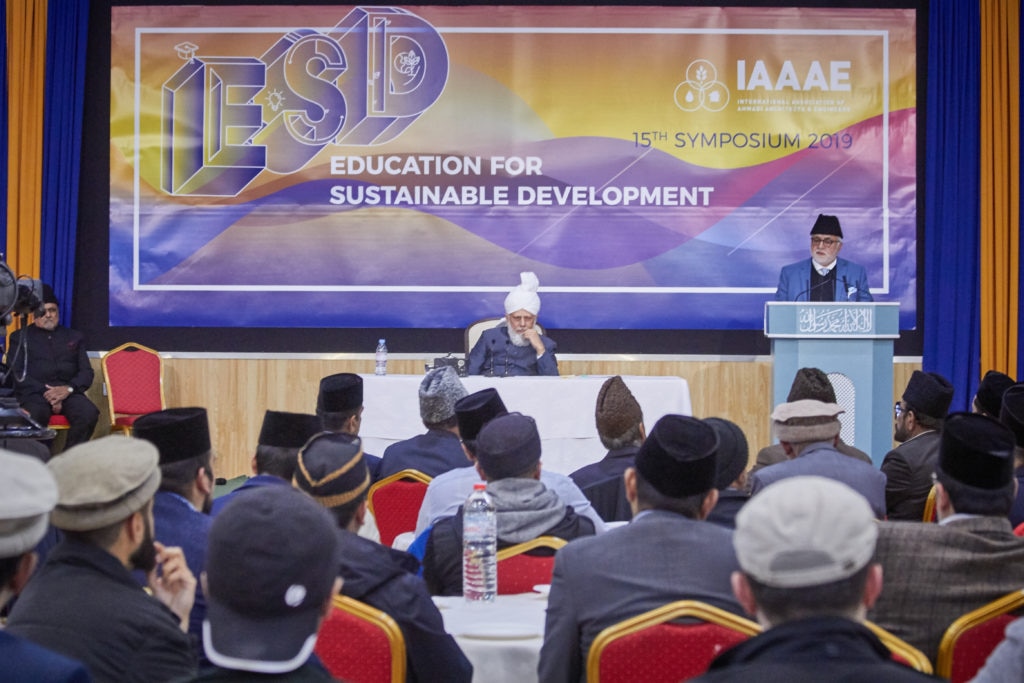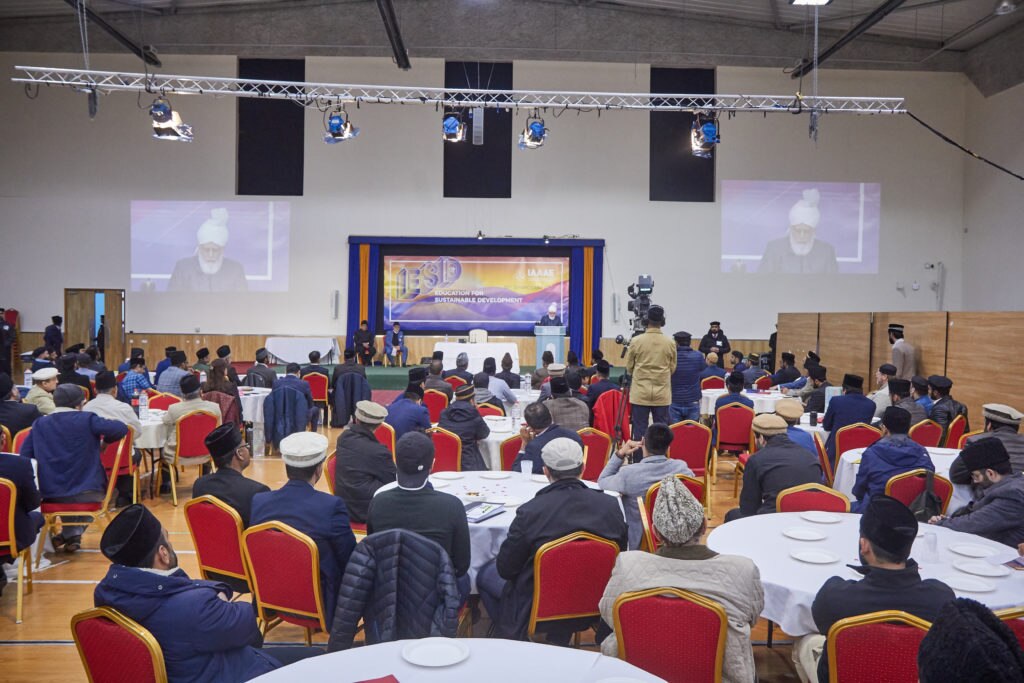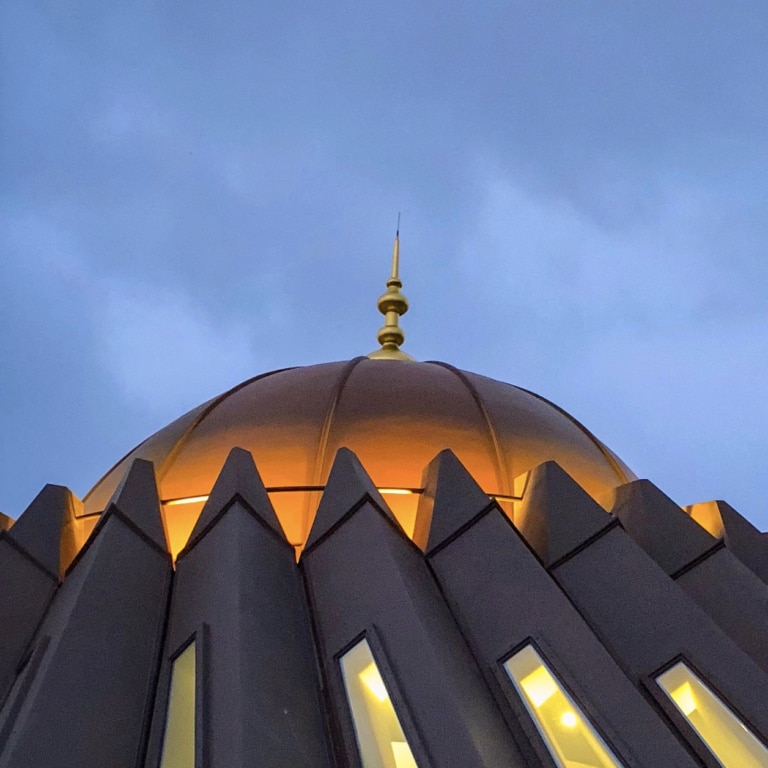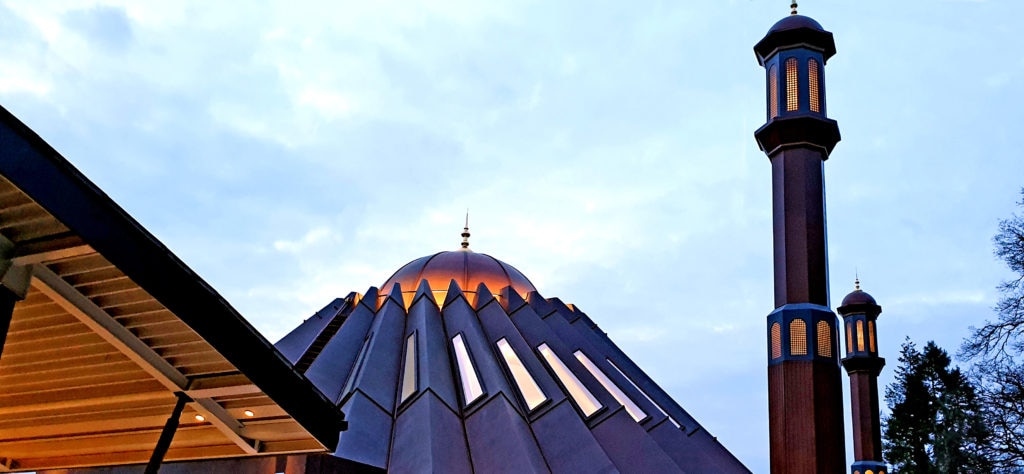Friday Sermon
5 April 2019
Delivered from Baitul Futuh Mosque
Men of Excellence
After reciting the Tashahud, Ta‘awuz, and Surah al-Fatihah, Hazrat Khalifatul Masih Vaa stated:
The first of the Companionsra
that I will mention today who took part in the Battle of Badr is Hazrat
Khiraashra bin Sima Ansari. Hazrat Khiraashra belonged to
the Banu Jusham, a branch of the Khazraj tribe. His mother’s name was Umme
Habeeb. Abdur Rahman and Aisha were among the children of Hazrat Khiraashra.
Hazrat Khiraashra participated in the battles of Badr and Uhud. He
sustained ten injuries on the occasion of Uhud. He was among the skilled
archers of the Holy Prophetsa. (Al-Tabaqaat-ul-Kubra
li ibn Sa‘d, Vol. 3, p. 425, khiraash bin al-Sima, Dar-ul-Kutub
al-Ilmiyya, Beirut, 1990)
Hazrat Khiraashra
took Abul Aas, the son-in-law of the Holy Prophetsa, as captive and
imprisoned him during the Battle of Badr. (Sirat ibn Hisham,
vol. 1, p. 312, Isr Abi al-Aas ibn Rabi’ Zauj Zainab bint Rasulillah, Dar Ibn
Hazm, Beirut, 2009)
The second companion to be
mentioned is Hazrat Ubaid bin Tayyihanra. The name of Hazrat Ubaid
bin Tayyihanra is also reported as Ateek bin Tayyihan. His mother’s
name was Laila bint Ateek. He was the brother of Hazrat Abul Haitham bin
Tayyihan. He was among the confederates of Banu Abdil Ash‘al. He participated
in the Bai‘at-e-Aqabah along with 70 Ansar. The Holy Prophetsa
established a bond of brotherhood between him and Hazrat Masudra bin
Rabee. He participated in the Battle of Badr along with his brother, Hazrat
Abul Haithamra. He attained martyrdom during the Battle of Uhud. He
was martyred by Ikrimah bin Abu Jahl. However, in another narration it states
that he was martyred during the Battle of Siffin whilst fighting on the side of
Hazrat Alira. There exists a difference of opinion regarding this
matter. In any case, the common factor in both of the narrations is that he
attained the status of martyrdom. From among his children, we particularly find
mention of Hazrat Ubaidullahra and Hazrat Abbadra.
According to the account of Tabari, Hazrat Abbadra also participated
in the Battle of Badr, and with regard to Hazrat Ubaidullahra it
states that he was martyred during the Battle of Yamama. (Al-Tabaqaat-ul-Kubra
li ibn Sa‘d, Vol. 3, pp. 342-343, Abul Haitham bin al-Tayyihan, Ubaid bin
al-Tayyihan, Dar-ul-Kutub al-Ilmiyya, Beirut, 1990) (Usdul Ghaba, Vol.
3, p. 153, Abbad bin Ubaid, p. 521, Ubaidullah bin Ubaid bin al-Tayyihan, p.
529, Ubaid bin al-Tayyihan, Dar-ul-Kutub Ilmiyyah, Beirut, 2003)
The next companion is Hazrat
Abu Hannah Malik bin Amrra. Abu Hannah was his title, while his
actual name was Malik bin Amr. Muhammad bin Umar Waqidi has counted him among
those who took part in the Battle of Badr. There are varying opinions regarding
his name. In some narrations, his name is reported as Aamir and also Thabit bin
Numan. His title is also reported as Abu Habbah and Abu Hayyah. However,
Muhammad bin Umar Waqidi states that two people are reported to have the title
of Abu Habbah; one is Abu Habbah bin Ghazziyyah bin Amr and the other is Abu
Habbah bin Abd Amr al-Ma‘azani. Neither of the two participated in the Battle
of Badr. None of the participants of the Battle of Badr bore the title of “Abu
Habbah”. An individual, who participated in the Battle of Badr did however bear
the title of “Abu Hannah”. Due to this, he emphasises that his title was indeed
Abu Hannah. (Al-Tabaqaat-ul-Kubra li ibn Sa‘d, Vol. 3, p.
365, Abul Hannah, Dar-ul-Kutub al-Ilmiyya, Beirut, 1990) (Usdul Ghaba,
Vol. 6, p. 63, Abu Habbah al-Ansari, Dar-ul-Kutub Ilmiyyah, Beirut, 2003)
The next companion to be
mentioned is Hazrat Abdullahra bin Zaid bin Tha‘labahra.
He was known as Abdullah Bin Zaid Ansari and his title was Abu Muhammad. His
father’s name was Hazrat Zaidra Bin Tha’labah, who was also a
companion of the Holy Prophetsa. He belonged to the tribe Banu
Jusham from the branch of Khazraj. He participated in the Bai‘at at Aqabah
along with 70 Ansar. He participated in the battles of Badr, Uhud, Khandaq and
all other battles along with the Holy Prophetsa. During the conquest
of Mecca, he was carrying the flag of Banu Harith bin Khazraj. Hazrat Abdullah
bin Zaidra was proficient in writing Arabic prior to his acceptance
of Islam. This was at a time when writing was very uncommon among the Arabs and
there were only a few people who knew how to write.
The children of Hazrat
Abdullah bin Zaidra remained in Medina. One of his sons was called
Muhammad, who was born to him from his wife, Sa‘dah bint Kulaib. One of his
daughters was Umm-e-Humaid, whose mother was from Yemen.
His brother, Hurais bin
Zahid, was amongst the Companions of Badr. (Usdul Ghaba, Vol.
3, p. 248, Abdullah bin Zaid al-Ansari, Dar-ul-Kutub Ilmiyyah, Beirut, 2003) (Al-Tabaqaat-ul-Kubra
li ibn Sa‘d, Vol. 3, pp. 405-406, Abdullah bin Zaid Huraith bin Zaid,
Dar-ul-Kutub al-Ilmiyya, Beirut, 1990)
The name of one of his
sisters was Quraibah bint Zaid and she was also counted amongst the female
companions. (Al-Tabaqaat-ul-Kubra li ibn Sa‘d, Vol. 8, pp.
271-272, Qareebatu bint Zaid, Dar-ul-Kutub al-Ilmiyya, Beirut, 1990)
Hazrat Abdullah bin Zaidra
is that very companion, who was taught the words of the Azan [Islamic call to
prayer] in a dream. He informed the Holy Prophetsa about this, upon
which the Holy Prophetsa instructed Hazrat Bilalra to
call the Azan according to the words Hazrat Abdullahra saw in the
dream. This incident occurred in the first year of Hijra, after the Holy
Prophetsa had constructed Masjid Nabawi. (Al-Isti’ab fi
Ma’rifatis Sahaba, Vol. 3, p. 913, Abdullah bin Zaid, Dar-ul-Jeel, Beirut,
1992)
Some of the details are as
follows. Hazrat Abu Umair bin Anas Ansarira was from among the
Ansar. He narrates on the authority of his paternal uncles that they said that
the Holy Prophetsa deliberated as to how to gather Muslims for
prayer. It was suggested to him that a flag should be hoisted at the time for
prayer and when people observed it, they would inform each other. However, the
Holy Prophetsa did not approve of this suggestion. The narrator says
that the blowing of a horn was suggested to the Holy Prophetsa, that
is to adopt the method of the Jews by blowing loudly into a horn. However, the
Holy Prophetsa disliked adopting this method of the Jews as well.
The narrator further says that the use of a bell was mentioned to the Holy
Prophetsa. The Holy Prophetsa said that this was the
method of the Christians. Hazrat Abdullah bin Zaidra returned and
felt anxious due to the concerns of the Holy Prophetsa. He offered
supplications and says that he was subsequently shown the words of the Azan in
a dream.
Hazrat Abdullah bin Zaidra
continues to narrate that he saw a person in a dream, who was holding a bell in
his hand. He enquired, “O servant of God! Are you going to sell this?” The
person replied, “What are you going to do with it?” I said, “We will use it to
call people towards prayer.” He replied, “Shall I tell you of something that is
better than this?” I said, “why not!” Hazrat Abdullah says that he then
repeated the words of the Azan:
اَللّٰہُ
أَکْبَرُ اللّٰہُ أَکْبَرُ۔ اَللّٰہُ أَکْبَرُ اللّٰہُ أَکْبَرُ۔ أَشْھَدُ أَنْ
لَّا اِلٰہَ اِلَّااللّٰہُ۔ أَشْھَدُ أَنْ لَّا اِلٰہَ اِلَّااللّٰہُ۔ أَشْھَدُ
أَنَّ مُحَمَّدًا رَّسُوْلُ اللّٰہِ۔ أَشْھَدُ أَنَّ مُحَمَّدًا رَّسُوْلُ
اللّٰہِ۔ حَيَّ عَلَی الصَّلَاۃِ۔ حَيَّ عَلَی الصَّلَاۃِ۔ حَيَّ عَلَی
الْفَلَاحِ۔ حَيَّ عَلَی الْفَلَاحِ۔ اَللّٰہُ أَکْبَرُ اللّٰہُ أَکْبَرُ۔ لَآ
اِلٰہَ اِلَّااللّٰہُ
I will also read its
translation as it will prove beneficial for children as well as for Muslim
converts. We hear the Azan daily, however, I have observed that some people are
not even aware of its translation. The translation is:
“Allah is the Greatest; Allah
is the Greatest (to be repeated twice). I bear witness that there is none
worthy of worship except Allah (to be repeated twice). I bear witness that
Muhammad is the Messengersa of Allah (also to be repeated twice).
Come to prayer; come to prayer. Come to success; come to success. Allah is the
Greatest (again to be repeated twice). There is none worthy of worship except
Allah.”
He then continues to narrate
that after repeating these words, this individual distanced himself somewhat
from him and then said, “When you are standing, ready to pray, you should say
the following. He then repeated the words of the takbir [iqamah]:
اَللّٰہُ
أَکْبَرُ اللّٰہُ أَکْبَرُ۔ أَشْھَدُ أَنْ لَّا إِلٰہَ إِلَّااللّٰہُ۔ أَشْھَدُ
أَنَّ مُحَمَّدًا رَّسُوْلُ اللّٰہِ۔ حَيَّ عَلَی الصَّلَاۃِ۔ حَيَّ عَلَی
الْفَلَاحِ۔ قَدْ قَامَتِ الصَّلَاۃُ۔ قَدْ قَامَتِ الصَّلَاۃُ۔ اَللّٰہُ أَکْبَرُ
اللّٰہُ أَکْبَرُ۔ لَآ اِلٰہَ اِلَّا اللّٰہُ
These are the same words of the
Azan with the addition of the words, “Qad qamat-is-Salah” i.e. “the
prayer has begun; prayer has begun”. Following this, the same words of “Allah
is the Greatest; Allah is the Greatest” are repeated.
Hazrat Abdullahra
further says, “The next morning, I presented myself before the Holy Prophetsa
and informed him of my dream. The Holy Prophetsa said, ‘If Allah
wills, this is a true dream. Stand with Bilal and tell him what you saw, so
that he may call the Azan according to those words, as his voice is louder than
yours.’ Hence, I stood with Bilal and continued to tell him the words and he
continued to call the Azan accordingly.”
The narrator further states,
“Hazrat Umar bin Khattab, may Allah be pleased with him, was in his home when
he heard the Azan. He left his home, dragging along his cloth which he used as
an outer garment and said, ‘O prophetsa of Allah! I swear by Him,
Who has sent you with the truth! I saw exactly what he saw in his dream.’
Hearing this, the Holy Prophetsa said, ‘All praise belongs to Allah
the Exalted.’” (Sunan Abi Daud, Kitab al-Salat, Bab Bad’ul Azan, Hadith
498, Bab Kaifal Azan, Hadith 499)
In another narration, it
states that the Holy Prophetsa said, “To Allah belongs all praise;
this indeed is the truth.” (Jami’ al-Tirmidhi, Kitabus Salat, Bab ma
Jaa’a fi Bad’il Azan, Hadith 189)
Hazrat Mirza Bashir Ahmadra
has written further details to this account in Sirat Khatamun-Nabiyyin,
using various sources of Islamic history. He writes:
“Until now there was no
arrangement for a call to Salat, or Azan etc. The Companions would generally
congregate in the mosque at the approximate time themselves. These state of
affairs, however, were not satisfactory. Upon the construction of
Masjid-e-Nabawi, the question as to how Muslims would be congregated at the
appropriate time was felt even more. One Companion proposed the use of a bell,
like the Christians. Someone proposed the use of a trumpet, like the Jews; and
others made other suggestions. However, Hazrat Umarra proposed that
an individual be appointed to announce that it was time for Salat at the
appointed time. The Holy Prophetsa approved this proposal, and
appointed Hazrat Bilalra to perform this duty (this was prior to the
formal establishment of the Azan). As such, after this, when the time for Salat
would arrive, Hazrat Bilalra would announce in a loud voice:
اَلصَّلَاۃُ
جَامِعَۃٌ
and people would congregate
for the Salat. As a matter of fact, the very same call would be made if it was
necessary to congregate the Muslims in the mosque for a purpose other than the
Salat as well. Sometime afterwards, the words of the current Azan were taught
to a Companion named Abdullah bin Zaid Ansarira, in a dream. He
presented himself before the Holy Prophetsa and mentioned this dream
saying, ‘I saw an individual in my dream call out such and such words as if
calling the Azan.’ The Holy Prophetsa said, ‘This dream is from
Allah,’ and instructed ‘Abdullahra to teach these words to Bilalra.
A strange coincidence was that when Bilalra called out the Azan in
these words for the very first time, upon hearing them, Hazrat Umarra
made haste to the Holy Prophetsa and said, ‘O Messenger of Allah!
Today, the words in which Bilalra called out the Azan were exactly
those which I also saw in my dream.’ In
one narration it has also been related that when the Holy Prophetsa
heard these words of the Azan, he said, ‘Revelation has already been sent down
as such.’” (Sirat Khatamun-Nabiyyin, Hazrat Mirza Bashir Ahmadra,
pp. 271-272)
Bashir
bin Muhammad relates from his father:
“Hazrat Abdullah bin Zaidra,
(i.e. the companion who saw a dream about the Azan), offered his entire wealth
in charity and nothing remained with him. The wealth they had was their only
means of provisions for him and his son. When Hazrat Abdullah bin Zaidra
handed everything to the Holy Prophetsa, his father approached the
Holy Prophetsa and requested: ‘O Messengersa of Allah!
Abdullah bin Zaidra has offered his wealth towards charity. However,
that wealth was serving as a means of our provisions.’ When the Holy Prophetsa
heard this, he called for Abdullah bin Zaidra and stated, ‘Allah has
accepted the charity that you offered. However, return this to your parents as
an endowment.’” Thus, his father states that they acquired this wealth as an
inheritance and their future generations were able obtain a share from it
later. (Ma‘rifatis Sahaba Li Abi Na’eem al-Asbahani, Vol. 3, p. 149,
Abdullah bin Zaid…, Hadith 4172, Darul Kutub al-Ilmiyya, Beirut, 2002)
On one occasion, the Holy
Prophetsa bestowed his nails to Hazrat Abdullahra bin
Zaid as a blessed gift. The details of this incident are that Muhammad, the son
of Hazrat Abdullah bin Zaidra narrates that on the occasion of Hajjat
ul Wida, his father was with the Holy Prophetsa in the plain of
Mina at the Manhar, i.e. the place where the sacrifices are offered. There was
another person from the Ansar who was present there as well. When the Holy
Prophetsa distributed the sacrificed animals, Hazrat Abdullah bin
Zaidra and his Ansari companion did not receive any share of the
sacrifice. Thereafter, the Holy Prophetsa had his hair cut and
placed his hair on a piece of cloth and distributed this among the people. Then
he had his nails cut and granted them to Hazrat Abdullah bin Zaidra
and his Ansari companion. (Al-Tabaqaat-ul-Kubra li ibn Sa‘d,
Vol. 3, p. 406, Abdullah bin Zaid, Dar-ul-Kutub al-Ilimiyya, Beirut, 1990)
Hazrat Aishara
narrates, “A person came to the Holy Prophetsa and requested, ‘O
Messenger of Allah! By God, you are undoubtedly more beloved to me than my own
self, my family and my children. I was at home thinking about you, and I could
not hold myself back to the point that I just had to come and meet you and now
I am looking at you. When I thought about the idea of you and I passing away, I
realised that after entering paradise, you shall be exalted along with other
prophets. So I became afraid that when I enter paradise, I will not be able to
find you.’ The Holy Prophetsa did not respond to this person until
the angel Gabriel descended with the revelation of the following verse:
وَ مَنۡ یُّطِعِ
اللّٰہَ وَ الرَّسُوۡلَ فَاُولٰٓئِکَ مَعَ الَّذِیۡنَ اَنۡعَمَ اللّٰہُ عَلَیۡہِمۡ
مِّنَ النَّبِیّٖنَ وَ الصِّدِّیۡقِیۡنَ وَ الشُّہَدَآءِ وَ الصّٰلِحِیۡنَ
‘And whoso obeys Allah and
this Messenger of His shall be among those on whom Allah has bestowed His
blessings, namely, the Prophets, the Truthful, the Martyrs, and the Righteous.
And excellent companions are these.’” (Surah al-Nisa, Ch.4: V.70) (Tafsir
Ibn Kathir, Vol. 2, p. 311, al-Nisa: 69, Darul Kutub al-Ilmiyyah, Beirut,
1998)
We present this verse to
support the argument that one can attain the status of a non-law bearing
prophet through one’s devotion and subservience to the Holy Prophetsa.
And through one’s complete obedience to the Holy Prophetsa, one can
progress from being at the stage of righteousness to the status of a prophet.
In any case, the status of a non-law bearing prophet, which can only be
achieved through one’s subservience to the Holy Prophetsa, is indeed
of a lofty status and God Almighty can grant this status to whomsoever He
wills. Moreover, in relation to the Promised Messiah, the Holy Prophetsa
himself has used the word Nabiullah i.e. that he would be a prophet of
God. (Sahih Muslim, Kitabul Fitan Wa Ashraat al-Saa‘ah, Bab Dhikr
al-Dajjal Wa Sifatihi Wa ma Ma’ahu, Hadith 2937)
For this reason, we accept
the Promised Messiahas as a non-law bearing prophet who came in the
complete servitude of the Holy Prophetsa. This does not cause any
blemish on the finality of his prophethood. Rather it elevates his status
further, making the blessing of prophethood attainable, but only through the
servitude of the Holy Prophetsa. We are not alone in holding this
interpretation; previous scholars have presented it as well. For instance, Imam
Raghib has also stated that a non-law bearing prophet can come after the Holy
Prophetsa but only through complete obedience to him. (Tafsir
Al-Bahrul Muheet, Vol. 3, p. 299, Al-Nisa:69, Darul Kutub al-Ilmiyyah,
Beirut, 2010)
However, I have mentioned
this as an additional point in light of this verse so that the matter is
properly clarified.
Allama Zurqani writes that
the aforementioned incident is found in various books of Quranic commentaries
and records the name of Hazrat Thobanra, who was a servant of the
Holy Prophetsa. Whereas in Tafsir Yanbu’ Al Hayaat, Muqatil bin
Sulaiman relates that the aforementioned incident was in relation to Hazrat
Abdullah bin Zaid Al Ansarira – i.e. the companion who had seen the
wordsof theAzan in his dream.
However, Allama Zurqani
writes that if this is the case, it is likely that both may have mentioned it
to the Holy Prophetsa upon which this Quranic verse was revealed.
This particular narration has been linked to many companions of the Holy
Prophet. (Sharh Zurqani Alaa al-Mawahib al-Deeniyyah, Vol. 12, pp.
417-418, Khatimah, Darul Kutub al-Ilmiyyah, Beirut, 1996)
Aside from the aforementioned
incident, various commentaries have also mentioned Hazrat Thoban’sra
incident and what he said to the Holy Prophetsa. Its detail are as
follows:
Hazrat Thobanra
had intense love for the Holy Prophetsa and could not bear to be
away from him for too long. One day when he presented himself before the Holy
Prophetsa, he seemed to be greatly perturbed and looked to be in a
state of great sorrow. The Holy Prophetsa enquired of the cause of
why he was overcome with such a state. Hazrat Thobanra replied that
he suffered from neither ailment nor disease except that he had not been able
to see the Holy Prophetsa. Meaning, the only reason for this downed
and distressed expression was the result of not having seen the Holy Prophetsa
for such a long time.
He states:
“I remained in this state
until I finally met you. Similarly, when I thought of the Day of Judgment, I
again was overcome with a state of fear as I realised I would not be in your
blessed presence for you would have been exalted to a higher station in
paradise with the other prophets. Then, even if I am granted entry into
paradise, my status would be far too insignificant to yours; and if I am not
granted entry, I would forever be left bereft of seeing you.” (Tafsir
al-Baghwi, Vol. 1, p. 450, Al-Nisa:69, Idarah Ta’leefaat Ashrafiyyah,
Multan, Pakistan, 1424A.H.)
Allama Zurqani writes that
Hazrat Abdullah bin Zaidra was once working in his garden. (The
account of Hazrat Abdullahra continues) and it states that his son
came, informing him of the demise of the Holy Prophetsa. Upon this
he said:
اللّٰھُمَّ
اَذْھِبْ بَصَرِیْ حَتّٰی لَا اَرٰی بَعْدَ حَبِیْبِیْ مُحَمَّدً اَحَدًا
That is, “O Allah take from
me my sight so that after the departure of my beloved Muhammadsa, I
may not have to see another individual again.”
It is written in the
commentary of Zurqani that after this incident, his eyesight gradually weakened
until he became completely lost his sight. (Sharh Zurqani Alaa al-Mawahib
al-Deeniyyah, Vol. 9, pp. 84-85, Fi Wujoob Mahabbatihi Wa Ittiba’
Sunnatihi, Darul Kutub al-Ilmiyyah, Beirut, 1996)
There is a difference in
opinion with regard to the demise of Hazrat Abdullah bin Zaidra.
Some have written that he passed away after the Battle of Uhud. However,
majority have written that he took part in all battles alongside the Holy
Prophetsa and passed away much later in the year 32 AH in Medina,
during the caliphate of Hazrat Usmanra. Likewise, the incident
regarding the loss of his eyesight – if accepted to be accurate – also points
to his passing away in the time of Hazrat Usmanra at the age of 64.
His funeral prayer was led by Hazrat Usmanra. (Al-Mustadrak
Ala Al-Sahihain Lil-Hakim, Vol. 5, p. 266, Kitab al-Fara’idh, Hadith 8187,
Dar-ul-Fikr, 2001) (Al-Tabaqaat-ul-Kubra li ibn Sa‘d, Vol. 3, p. 406,
Abdullah bin Zaid, Dar-ul-Kutub al-Ilimiyya, Beirut, 1990)
Then, the next companion is
Hazrat Muazra bin Amr bin Jamooh. He belonged to a branch of the
Banu Khazraj called Banu Salma. He participated in the Second Bai‘at at Aqabah
as well as the battles of Badr and Uhud. His father, Hazrat Amrra
bin Jamooh, was a companion of the Holy Prophetsa who was martyred
in the Battle of Uhud. His mother’s name was Hind bint Amr. According to Musa
bin Uqbah Abu Ma‘shar and Muhammad bin Amr Waqidi, his brother, Muawwiz bin
Amr, also partook in the Battle of Badr. His wife’s name was Subaitah bint Amr
who belonged to Banu Sa‘idah, a branch of the Banu Khazraj tribe. He had one
son with her named Abdullah and a daughter named Ummamah. (Al-Tabaqaat-ul-Kubra
li ibn Sa‘d, Vol. 3, pp. 426-427, Mu’adh bin Amr, Dar-ul-Kutub al-Ilimiyya,
Beirut, 1990) (Al-Siratun Nabawiyyah Li Ibn Kathir, p. 197,
Fasl fi Ruju al-Ansar Lailat al-Aqabah al-Thania ilaa al-Medina, Dar-ul-Kutub
al-Ilimiyya, Beirut, 2005)
Hazrat Muazra
participated in the second Bai‘at at Aqabah, but his father, Amr bin Jamooh,
remained firm upon his idolatrous beliefs. The story of the conversion of
Hazrat Muaz’s father is recorded in Sirat Ibn Hisham. About a year ago,
I mentioned this incident in relation to his account. It states that when those
who had participated in the second Bai‘at at Aqabah returned to Medina, they
actively spread the message of Islam. There were still some elders among their
people who remained firm on their polytheistic beliefs. Among these was also
Amr bin Jamooh. His son, Hazrat Muaz bin Amr had participated in the second
Bai‘at at Aqabah and had pledged allegiance on this occasion to the Holy
Prophetsa.
Amr bin Jamooh was among the
chieftains of the Banu Salma tribe and was one of their elders as well. He kept
an idol carved from wood in his house, as was the practice of elders in those
days. This idol was called Manat, and they would show respect to it and revere
it. When some young men from the Banu Salma tribe accepted Islam, among whom
was also Hazrat Muaz bin Jabl and the son of Amr bin Jamooh, i.e. Hazrat Muaz
bin Amr bin Jamooh (who was also among this group of youth who had converted at
the second Bai’at at ‘Aqabah).
One night, these young men
entered into his idol-chamber and brought back the idol, and laid it down
face-first in a pit that was dug out for the Banu Salma tribe to throw their
waste. The next morning, when Amr woke up, he cursed those who had taken away
their idol in the night and shown enmity towards it. He then went in search of
it and when he found it, he washed and cleaned it, saying, “I swear to god, if
I find out who has done this to you, I will certainly ruin him.” And when the
night fell and Amr would be asleep, his son would repeat the act. When morning
came, Amr bin Jamooh again did the same thing, undertook the same effort to
look for it and washed it, etc.
When several nights passed
like this, Amr bin Jamooh removed the idol from where it had been thrown,
washed it and cleaned it. Then he brought his sword and hung it around its
neck, saying, “By God, I don’t know who is doing this to you. So if you have
any power at all, here is a sword I leave with you. Use it to stop him.” And he
placed the sword by the idol. When the sun set and Amr went to sleep, the same
youth, among whom was also his son, did the same thing to the idol. Removing
the sword from around its neck, they tied the idol to a dead dog with a rope,
casting it into an old well of the Banu Salma tribe which was used to dispose of
waste. When Amr bin Jamooh awoke in the morning and didn’t find the idol where
he had left it, he went out in search of it, until he found it lying face-first
tied to a dead dog in the well.
When he witnessed this sight,
the truth of his erred ways opened up to him. The Muslims of his tribe also
introduced him to the teachings of Islam, and by Allah’s mercy, he became a
Muslim. (Al-Siratun Nabawiyyah Li Ibn Hisham, pp. 207-208, Sanam Amr bin
al-Jamooh, Dar-ul-Ibn Hazm, Beirut, 2009)
This incident has been
recorded in the Sirat of Ibn Hisham, and it also states that he said, “This
idol couldn’t even do anything with a sword. What benefit could there possibly
be in worshiping such a god.”
Hazrat Muaz bin Amr bin
Jamooh took part in the killing of Abu Jahl. It is written in Sahih Bukhari,
“Salih bin Ibrahim narrates on the authority of his grandfather, Abdur Rahman
bin Auf that he stated: ‘I was standing in the rows for battle on the day of
Badr. When I looked to my right and left, I saw two Ansari youths standing on
either side of me. At
that moment, I wished that I was in between two people who were more mature and
stronger. One of the youths nudged my hand and asked: “O my uncle! Do you
recognise Abu Jahl?” to which I said, indeed I recognise him, why is it that
you ask?” The youth replied: “I heard that he would use foul language for the
Holy Prophetsa. I swear by the One in Who’s hands is my life, if I
see him I will not let him out of my sight until the one who’s destined to die
from among us perishes.” I was astonished by this reply. Then the other youth
also tapped my hand and made the same enquiry. A short while passed when I saw
Abu Jahl walking between the ranks. I said to the youths that there was the one
about whom they enquired. Immediately the two youths drew their swords and
cutting the ranks pounced on Abu Jahl and killed him. They then returned to
inform the Holy Prophetsa of the news. The Holy Prophetsa
asked which one from among them killed him? They both laid claim to the kill.
The Holy Prophetsa then asked whether they had wiped their swords
after they had killed him? They replied in the negative. The Holy Prophetsa
then inspected their swords and said that both of them had in fact killed him.
The Holy Prophetsa then said that the spoils of war would be given
to Muaz bin Amr bin Jamooh. Both youth had the same name; one was Muaz bin
Afraa and the other was Muaz bin Amr bin Jamooh.’” (Sahih al-Bukhari, Kitab
Fardil Khumus, Bab Man Lam Yakhmus al-Aslab, Hadith 3141)
This incident regarding Abu
Jahl has been narrated before in the earlier sermons, in which it was mentioned
that it was Muaz and Muawwiz. Consequently, this could lead to doubt as the
latter refers to someone else. With regard to the killing of Abu Jahl, from
various books of Hadith – such as the narration of Bukhari as mentioned
earlier – as well as from books of history, we learn that Hazrat Muaz bin Amr
bin Jamoohra and Hazrat Muaz bin Afraara killed Abu Jahl,
and Hazrat Abdullah bin Masudra severed the head of Abu Jahl. In
another narration, the names of Muaz and Muawwiz are mentioned. Nonetheless, in
Bukhari there is another narration in which it is stated that Abu Jahl
was killed by the two sons of Afrah, Muaz and Muawwiz, and later Hazrat
Abdullah bin Masudra dealt the final blow to Abu Jahl. In the
narration of Bukhari, the details are as follows:
“Hazrat Anasra
narrates that on the day of the Battle of Badr, the Holy Prophetsa
said, ‘Who will go to see the outcome of Abu Jahl?’ Hazrat Ibn Masud went and
saw that the two sons of Afraa, Muaz and Muawwiz had attacked him with their
swords to the extent that he was on the brink of death. Ibn Masud enquired of
him: ‘Are you Abu Jahl?’ and took hold of his beard. Abu Jahl then said: ‘Have
you ever killed a person of greater rank?’ or perhaps he said: ‘Is there any
person greater than I, who is killed at the hands of his own people?’” (Sahih
al-Bukhari, Kitabul Maghazi, Bab Qatl Abi Jahl, Hadith 3962)
Both of these narrations are
found in Bukhari. In one narration both of them are named as Muaz, and
in the other incident they are recorded as Muaz and Muawwiz. Similarly, in one
of the narrations they are stated as two brothers, but in the other narration
the two youths are not related. With regard to how one can reconcile both of
these narrations in relation to the killing of Abu Jahl, Hazrat Syed Zainul
Abideen Waliullah Shah Sahibra writes:
“According to some
narrations, the two sons of Afraa, Muaz and Muawwiz, attacked Abu Jahl to the
extent that he was on the brink of death. After this Hazrat Abdullah bin Masud
severed his head. Imam Ibn Hajr has stated, ‘After Muaz bin Amr and Muaz bin
Afraa attacked Abu Jahl, Muawwiz must have attacked him as well.’” (Sahih
al-Bukhari, Vol. 5, p. 491, Hashiyah, Urdu Tarjumah, Nazarat Isha’at,
Rabwah)
For this reason, in one of
the narrations there is mention of two brothers and in other narration, there
is mention of two different youths who are not related.
In the commentary of Fath-ul-Bari,
it is written that perhaps all three of them attacked Abu Jahl.
Allama Badruddin Aini writes
regarding the death of Abu Jahl:
“Abu Jahl was killed by Muaz
bin Amr bin Jamooh, Muaz bin Afrah and Hazrat Abdullah bin Masud. Hazrat
Abdullah bin Masudra was the one who then brought the severed head
and presented it to the Holy Prophetsa.” (Umdatul Qari, Vol.
17, p. 120, Dar Ihyaa al-Turath al-Arabi, Beirut, 2003)
He further writes:
“In Sahih Muslim it is
written that Muaz bin Amr bin Jamooh and Muaz bin Afraa killed Abu Jahl. Muaz
bin Afraa’s father was Harith bin Rifa‘ah and his mother’s name was Afraa, who
was the daughter of Ubaid bin Tha‘labah Najjaria.”
Similarly, in Bukhari,
Kitabul Jihad, Bab Man Lam Yukhamis Al-Aslaab, it is written, “Hazrat Muaz bin
Amr cut the leg of Abu Jahl, as a result of which he fell down. Subsequently,
Muawwiz also launched an attack and left him on the ground. When Abu Jahl had
little life left in him, Hazrat Abdullah bin Masud dealt him the final blow,
severing his head.”
He further writes:
“If one questions the reason
why all these events needed to be mentioned together, then I would say that
perhaps they all had a hand in the killing of Abu Jahl.” (Umdatul Qari,
Vol. 17, pp. 121-122, Dar Ihyaa al-Turath al-Arabi, Beirut, 2003)
According to one narration of
Zurqani, when Hazrat Abdullah bin Masud found Abu Jahl, he was on the
brink of death. Hazrat Abdullah bin Masud put his leg on Abu Jahl’s neck and
said: “O enemy of God! God Almighty has humiliated you!” Abu Jahl replied
arrogantly: “I have not been humiliated! Have you ever killed a person greater
than myself?” Meaning that he did not feel any humiliation and then asked who
had been victorious in the battle. Hazrat Abdullah bin Masud replied that God
and His Messengersa were victorious.
According to another
narration, it is stated that Abu Jahl said:
“I was his [i.e. Muhammad’ssa]
enemy all his life, and even today, my enmity has not subsided in the
slightest.” Hazrat Abdullah bin Masud then severed his head and brought it to
the Holy Prophetsa. The Holy Prophetsa said, “Just as I
am the most beloved and revered of God from among all the prophets and my
people are the most honourable from all other nations, similarly, Abu Jahl is
the most severe and violent Pharaoh of all those who had pharaoh like traits.”
For this reason, it is stated in the Holy Quran:
حَتّٰۤی
اِذَاۤ اَدۡرَکَہُ الۡغَرَقُ ۙ قَالَ اٰمَنۡتُ اَنَّہٗ لَاۤ اِلٰہَ اِلَّا الَّذِیۡۤ
اٰمَنَتۡ بِہٖ بَنُوۡۤا اِسۡرَآءِیۡلَ
Meaning, “Till, when the
calamity of drowning overtook him, he said, ‘I believe that there is no
God but He in Whom the children of Israel believe”’ (Surah Yunus, Ch.10: V.91)
Thus, the Pharaoh of that era
was the gravest in terms of enmity and disbelief, and this is evident from the
last words of Abu Jahl.
Aside from this, in another
narration it is stated that when the Holy Prophetsa received news of
the death of Abu Jahl and saw his head, he said:
اَللّٰہُ
الَّذِیْ لَآاِلٰہَ اِلَّا ھُوَ
“There is no God but Allah,”
Similarly,
the Holy Prophetsa repeated three times:
اَلْحَمْدُ
لِلّٰہِ الَّذِیْ أَعَزّ الْاِسْلَامَ وَأَھْلَہٗ
“All Praise is due to Allah, Who honoured
Islam and its followers.” Another narration states that the Holy Prophetsa
said, “Every nation has a Pharoah. In this era, the pharaoh was Abu Jahl, who
God Almighty destroyed in a terrible manner.” (Sharh Zurqani Alaa al-Mawahib
al-Deeniyyah, Vol. 2, pp. 297-298, Darul Kutub al-Ilmiyyah, Beirut, 1996)
Hazrat Muaz bin Amr bin
Jamoohra passed away during the Caliphate of Hazrat Usmanra.
(Al-Isaba Fi Tameez Al-Sahaba, Vol. 6, p. 114, Muaz bin
Amr bin Jamooh, Dar-ul-Kutub al-Ilmiyya, Beirut, 1995)
Khalifa bin Khiyaat states,
“On the day of the Battle of Badr, Muaz bin Amr bin Jamooh suffered a wound as
a result of which he remained unwell until the caliphate of Hazrat Uthmanra.
He passed away in Medina. Hazrat Usmanra led his funeral prayer and
buried him in Jannatul Baqi.
Hazrat Abu Hurairahra
narrates that the Holy Prophetsa said, “Muaz bin Amr bin Jamooh was
an exceptional individual.” (Al-Mustadrak Ala Al-Sahihain
Lil-Hakim, Vol. 4, pp. 140-141, Dhikr Manaqib Mu’adh bin Amr bin al-Jamooh,
Hadith 5895-5897, Dar-ul-Fikr, Beirut, 2002)
May God Almighty shower His
endless mercy on all those who immersed themselves in the love of God and His
beloved, and attained their pleasure.
After the Friday prayers, I
will lead a funeral prayer in absentia of respected Malik Sultan Harun Khan
Sahib, who passed away on 27 March in Islamabad. Inna Lillah Wa Inna Ilahi
Rajioon.
His eldest son is the
son-in-law of Hazrat Khalifatul Masih IVrh, married to his youngest
daughter. Malik Sultan Harun Sahib was a born Ahmadi and his father’s name was
Col Malik Sultan Muhammad Khan Sahib, who did Bai‘at at the hand of Hazrat
Musleh-e-Maudra in 1923 at the age of 23. At the time, he was the
only Ahmadi in his family. Hazrat Musleh-e-Maudra himself arranged
his marriage with respected Aishah Siddiqa Sahiba, daughter of Hazrat Chaudhry
Fateh Muhammad Siyal Sahib.
He belonged to a very
honourable and noble family of the Punjab. Malik Amir Muhammad Khan, who was
the Governor of West Pakistan and was famously known by the title of Nawab
Kalabagh, was the paternal cousin of Malik Sultan Harun Khan Sahib’s father,
i.e. Col Malik Sultan Muhammad Sahib. His grandfather was Malik Sultan Surakh
Ruh Khan and in those days, India and Pakistan were a colony of the British
Empire, however, owing to his status of Nawab, he was held in high regard by
them. Four years after the Bai‘at of his son, Malik Sultan Muhammad Khan Sahib
also had the honour of accepting Ahmadiyyat. Despite heavily immersed in
worldly endeavours, he had an inclination towards faith and due to this, God
Almighty blessed him with the opportunity to accept Ahmadiyyat.
Sultan Harun Khan Sahib was
married to Sabiha Hamid Sahiba, daughter of Chaudhry Abdul Hameed Sahib, who
was a General Manager at WAPDA. Hazrat Khalifatul Masih IIIrh led
their Nikah and during the Nikah sermon, regarding Chaudhry Fateh Muhammad
Siyal Sahib who was a pioneer missionary in England, Hazrat Khalifatul Masih
IIIrh stated: “Chaudhry Fateh Muhammad Siyal was a well-respected
elder of mine, and I am indeed indebted to him for his kindness.” Hazrat
Khalifatul Masih IIIrh further stated, “At a young age, while still
inexperienced, he would take me along with him and provided me with many
opportunities to enhance my experience. My affinity for those living in rural
areas which was concealed in my heart was able to be manifested through the
opportunities I received by staying with Chaudhry Fateh Muhammad Siyal.”
Hazrat Khalifatul Masih IIIrh
further stated, “Even now, when a simple villager meets me, I enjoy the frank
and straightforward conversation far greater than if I were to have a
conversation with someone from the city. This is because those living in the
cities have a habit of employing many formalities in their style of speech and
thus owing to this habit of theirs, I also naturally start conversing with them
in a similar way.”
Hazrat Khalifatul Masih IIIrh
further states, “Nevertheless, today I shall lead the Nikah ceremony of the
grandson of this benevolent elder of mine, Malik Sultan Harun Khan, son of Col
Sultan Muhammad Khan.”
Hazrat Khalifatul Masih IIIrh
further stated, “Members should pray that just as our elders selflessly and
with great sincerity served the religion of God, may this same passion to serve
the faith and the spirit of sacrifice continue extraordinarily in their
progeny.” (Khutbat-e-Nasir, Vol. 10, pp. 437-440)
By mentioning this again
today at the occasion of his funeral, I pray that may God Almighty enable Malik
Harun Sahib’s progeny to not only maintain a relationship with Ahmadiyyat and
Khilafat, but further strengthen it. The deceased has three sons and three
daughters, and as I mentioned his eldest son, Sultan Muhammad Khan is the
son-in-law of Hazrat Khalifatul Masih IVrh.
Malik Harun Sahib took great
care of the poor and needy of the local area. In particular, he treated those
women who had genuine needs with great kindness. The women also mentioned that
while Malik Sahib was alive, they felt very safe in their area, but now, after
his demise, they have become more fearful. There is a lot of hostility and
enmity in the area of Attock and the poor are neglected of their rights, but
despite being a landowner and an influential individual of the area, he took
great care of the poor. Sultan Harun Khan Sahib’s sister, Rashida Siyal Sahiba,
who resides in Canada says, “My brother, Sultan Harun Khan Sahib, possessed
many qualities. He had a great sense of honour for Ahmadiyyat and was willing
to sacrifice his life for the institution of Khilafat. He was a truly loyal to
his friends and courageous in the face of the enemy. He supported the poor and
needy.” She further states, “Once, Hazrat Khalifatul Masih IVrh
wrote a letter to me stating, ‘Your father, Col Sultan Muhammad Khan Sahib, was
like an unsheathed sword for Ahmadiyyat, and your brothers share the same
quality.’”
Once, there was a lot of
hostility in that area. On the one hand, there would be a lot of enmity over
land and wealth, but moreover, they had to endure far greater hostility owing
to them being Ahmadi. She writes, “Hazrat Khalifatul Masih IIIrh
said, ‘Bullets will be fired but they will pass over your head and Insha-Allah
nothing will happen to you.’” She writes, “They witnessed how the words of the
third Khalifa proved to be true. In 1977, an attempt was made to assassinate
Malik Sultan Harun Sahib at the Fatah Jang Police Station and shots were fired
at him, but the bullets passed just over the hair of his head and he did not
even sustain a scratch. Thus, God Almighty protected him in a miraculous
manner. He was extremely generous towards the poor and greatly supported those
who were helpless and weak.”
His elder brother, Malik
Sultan Rashid Khan Sahib, states, “After the demise of our father, Malik Sultan
Harun Sahib was the head of our family. Despite all my efforts, he would always
excel ahead of me when it came to serving the Jamaat. He was a true and ardent
devotee of the Promised Messiahas and for Khilafat-e-Ahmadiyyat.
After the events of 1974, a high-ranked officer once asked him in front of me
about the state of his faith in Khilafat and he responded in Punjabi that it
was like metal, i.e. his faith in Khilafat was as strong as steel. During the
migration of Hazrat Khalifatul Masih IVrh, he had the opportunity to
accompany him in the travel up to Karachi.”
Rashid Sahib further writes,
“In some of the letters which I have kept preserved of Hazrat Khalifatul Masih
IVrh, he mentioned that he was a valiant soldier of Ahmadiyyat and
an unsheathed sword in his love and honour for Ahmadiyyat.”
Rashid Sahib further writes,
“As far as his Nawafil [voluntary prayers] during the night and bond with the
Holy Quran is concerned, very few people will know because he never spoke about
this. However, in both aspects he was very regular. Perhaps I too would not
have come to know of this had I not shared the same room with him for four
months during my severe illness in 2016. During those days, it was extremely
difficult for me to stand up and sit down and he stayed with me in the same
room in order to take care of me. It was during that time I witnessed him
reciting the Holy Quran and offering Nawafil.”
He states, “I asked him to
appoint a few people to look after me instead of him looking after me, but he
asked what the need was for employing anyone else when he was there.”
Rashid Sahib further writes,
“He was a very caring person. Through many efforts, he built 9-10 schools. If
ever a time came when he did not have enough funds to pay for the construction
of the school, he himself would work alongside the labourers and would say to
them that he was doing more work than them. He never entertained the thought
that he was a son of a Nawab or that he was a landowner.”
His daughter, Mahmooda
Sultana Kashif Sahiba, writes, “My father’s love and loyalty for Khilafat is
not hidden from anyone. Right from my birth, my father always taught us to
always place our faith in God Almighty and to pray to Him in all of our dealings
and that nothing can be achieved without prayer. He had great trust in God
Almighty and was an extremely courageous and brave man. He did not fear anyone
expect God Almighty. He was always ready to serve mankind.”
Similarly, his son, Sultan
Muhammad Khan, writes, “My father did a lot of social work. He built 8 schools
and helped construct another two and also donated some land for the use of two
graveyards. He gave land for 8 schools to be built. He gave numerous poor
people jobs and helped them.”
May God Almighty grant him
His mercy and forgiveness and enable his progeny to continue his good deeds and
remain attached with the Jamaat and Khilafat. As I mentioned, I shall lead the
funeral prayer in absentia after the Friday Prayers.
(Translated by The Review of Religions)
(Originally published in Al Fazl International,
26 April 2019)

